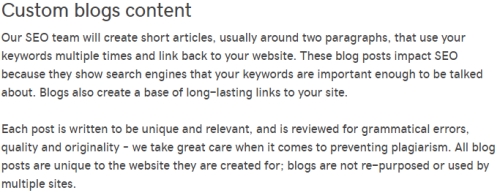
Nearly everybody I know has seen the movie Office Space (and often multiple times). People of my generation especially resonate with it because it accurately portrays many common flaws of the larger firms we’ve had to turn to in order to garner a steady paycheck, affordable insurance, and the experience nearly every entry-level position seems to demand in this economy.
I graduated college into the worst recession of my lifetime, and had to struggle for months to get a position that underpaid to have me take calls on behalf of Medco. During my time with APAC, they were bought out by Chase, and a difficult, often heartbreaking, job became intolerable (there are only so many times you can deny someone insurance coverage for their medication before it gets to you).
Recession or not, I had to find a new gig.
After some searching and consultations with a hiring agency, I moved on to Yellowbook (now hibu) as a web content writer. My new corporate overlord introduced different metrics, procedures, and targets to my daily routine, but the same suffocating office politics, inane restrictions, and outright lack of accountability I had found with APAC persisted.
These behaviors ran their course after a few years, culminating in the layoff of our writing and QA departments so they could be outsourced to freelancers and India. While this decision was made by placing profits over quality content (and went about as well as expected), it was no longer my problem because I was fortunate enough to land a position at GoDaddy.
My experience with GoDaddy started out as a breath of fresh air. Despite an extremely mediocre training program, I finally found myself in a position where I was able to make independent decisions and do everything in my power to help people resolve the issues they were bringing to me. There were definite hurdles and a steep learning curve for more advanced platforms, but I like to learn, so I was in my element.
Then they started becoming publicly traded. And that’s when the hammer dropped.
Jump ahead to:
Publicly traded companies tend to overvalue profit at the expense of all else.

Anytime banks become involved in your ownership, money ALWAYS becomes the primary focus. Not the customer, not ethics, and not you. Restrictions on what employees could do for customers started trickling in, followed by stricter rules on how to efficiently handle calls and higher sales metrics (which we were told would NEVER decrease, even during slow months).
Changes that did not fall within these criteria moved at a glacial pace from then on, mirroring the last two corporate environments I had worked in. By this point, I had the groundwork prepared for Midwest Websites and was sick of serving the bottom line at the expense of helping business owners. I set off on my own to offer people an option for the web design and search engine optimization (SEO) service they deserved online.
Despite how negative each of these experiences became, I don’t regret the time I spent with any of these companies. Truth be told, I learned valuable skills from each of them. I also found that most large companies run themselves using the same corporate playbook, even though it damages their reputations and creates incredible inefficiencies and deficiencies in areas of their production.
So what do all of these experiences and the visual representation Office Space brings to mind have to do with today’s article? As it happens, GoDaddy and hibu were (and still are) pretty involved in the SEO industry. I got to see the sausage being made during my time with them, and learned a few things about bigger companies’ SEO service that you should keep in mind before hiring one.
These points aren’t just limited to SEO packages either; each lesson can apply to nearly any product or service a large company offers.
Don’t take what you’re told at face value without a bit of research.
We’ve spoken about SEO at length in our blog, covering everything from what it is to broad strokes of more technical details. For a quick recap, the highlights include:
- Why SEO matters and easy steps to boost it
- The differences between black hat, white hat, and grey hat SEO
- Content’s role in SEO
- Schema’s role in technical SEO
- AMP and its role in mobile SEO
Each of these topics plays a leading role in the literary landscape we’ve created, but the subject is so vast that there are still many details yet to be explored. It’s also dense enough that even with dozens of hours of TLC, it’s hard to distill our knowledge and research down to a post that makes SEO an accessible, let alone enjoyable, read for those outside the industry.
 That doesn’t make it any less critically important though.
That doesn’t make it any less critically important though.
To help bring this point home, we’re going to shine a light on the importance of educating yourself on SEO’s finer points, and we’re going to use a big name in the industry to do it – GoDaddy.
During the years I worked for GoDaddy, there was a period of overlap where I both worked for them and was taking steps to get Midwest Websites off the ground. Because of this, I hold a strong understanding of their infrastructure (some of which I currently utilize), as well as that of their services. Many such areas of the company require specialized knowledge to operate, and have dedicated teams scattered throughout different global locations.
One such team was GoDaddy’s SEO services department. Not to be confused with either version of the Search Engine Visibility (SEV) product, this is a dedicated group of individuals who work to strengthen your SEO through methods on and off your website for a number of hours each month, depending upon the package you purchased.
Since they weren’t in the Iowa office, my hands-on knowledge of their SEO service plans was limited to a couple relatively short presentations and some sales consultations. Naturally, this created a bit of a blind spot in my knowledge of how they operate, but they said the right things, so I hired them for 20 hours a month for four months to see how they handled themselves. My to-do list was only growing, and I simply needed more time and hands to make the progress I wanted.
The way their plans are explained to GoDaddy employees, this team is primarily equipped to:
- Optimize on-site copy
- Optimize on-site elements like meta titles and alt tags
- Create & optimize off-site blog posts to build strong backlinks
Sure looks good on paper, doesn’t it? They were also quick to tout other services offered beyond these points, but they aren’t of any benefit worth discussing. In hindsight, I should have noted that for the red flag it was.
You should always read between the lines – even with big companies

After my SEO service representative told me they would need about 5 hours per page for my on-site work, I tried to follow their math. A contact page would take 5 hours? A 300 word introduction page? Adding 5 word tags to two photos?
I’m a professional writer and web developer, so I knew I could do this myself in a fraction of the time. With $48/hour on the line, I forbade them from touching my website and turned them loose on off-site work.
While this wasn’t a difficult decision for me to make, and one that I’m doubly glad I took under my wing given the results I received, it was also another serious warning flag I shouldn’t have ignored.
Sure, I asked additional questions and thought I’d done my due diligence, but I failed to consider how inefficient behavior in one area of work might translate to another.
As the months went by, I had been industriously completing a variety of tasks to get my website and online presence into a presentable state. SEO service takes several months to really start showing off the fruits of its labor, so I took some time during the fourth month of work to analyze what was done and see how far the backlinks and posts created on my behalf were taking me. Here is an example of what I found.
This isn’t an authority post with at least 2,000 words of good content. The blog was created 3 years ahead of mine and has way less content. I’ve never heard of these guys before. My rankings haven’t budged.
The pieces clicked into place and I realized hiring GoDaddy was a complete mistake.
For a more detailed breakdown of what I received, I’m going to start you with this review of what comes with an SEO package according to GoDaddy’s website. While I had a bit more to go on than what was here at the time, a number of the concerns outlined were either assuaged in my consultation or irrelevant for the tasks I wanted this team to complete.
Again, what looked good on paper sure missed the mark in practice.
Big companies often act slowly on change – especially with SEO service

I’m sure you’re asking how a giant online industry expert like GoDaddy spent four months making such little progress by this point. The answer lies within the “services” they offer. Spamming blogs with links in the comments, writing posts with backlinks on sites that have zero authority, and spending time on directory sites that often offer nothing of SEO benefit are all examples of antiquated techniques that are years behind the times.
So how do companies like GoDaddy continue to get away with this complacent behavior? Unfortunately, so few people are educated on the current state of SEO that the average customer doesn’t know a single detail of what I’ve elaborated on here. Others who think they’re educated see SEO services like GoDaddy’s as current practice. They don’t realize that times have changed and old techniques can actually hurt your website’s SEO now.
The worst part of all is that virtually none of their agents truly grasp the harm they’ve been doing by proactively offering these packages over the last few years. When you don’t know that something is broken, let alone understand WHY it is broken, how can you possibly fix it?
You can’t.
My story took place in early 2017, but virtually nothing has changed since then. GoDaddy has gotten so good at portraying themselves as the perfect small business advocate that their sheer customer numbers have kept people paying through the nose for this dated, low quality service. As long as the payments keep coming in, they have no motivation to reform the perfectly preserved and completely ineffective SEO tactics used since this program’s launch.
You always have a choice about how to handle a difficult situation
It would have been easy to give up on working with this website after wasting a lot of time and money with inferior service. It also would have been easy to continue allowing my employer to compromise my ethics and morals by continuing to sell their SEO service. Many things that are easy aren’t worth doing, however, so I chose to forge ahead.
I continued trying to make a difference in an increasingly toxic climate. I continued building up Midwest Websites while managing the stress and workload of that full time job. And now I have a business that is able to provide exceptional websites and SEO service while treating clients as the people they are, not as numbers, metrics, statistics, or suckers.
You can do the same for your business in a situation like mine. Whether you elect to devote extra time to make up for lost funds or call a proper expert to set things right (319-229-5225), a setback or defeat doesn’t need to be the end. Focus on winning the war when thinking of your business, not the loss of a battle.

Braden is one of the founders of Midwest Websites, and has been professionally writing and developing websites for over 7 years. His blog posts often take an experience from his life and showcase lessons from it to help you maximize online presence for your business.

